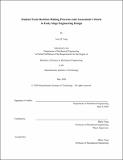Student team decision-making processes and assessment criteria in early stage engineering design
Author(s)
Fang, Amy Q.
Download1197727497-MIT.pdf (2.085Mb)
Other Contributors
Massachusetts Institute of Technology. Department of Mechanical Engineering.
Advisor
Maria Yang.
Terms of use
Metadata
Show full item recordAbstract
Background: Lab meetings are observed at the beginning and the middle of a senior product design capstone course for mechanical engineering students. Purpose: This paper seeks to understand how social team decision-making processes and assessment criteria affect the quality and process of group coherence and communication for mechanical engineering students Design and Method: Audio and video meeting recordings with written transcripts, mid-term product milestone evaluations, and course materials are analyzed through qualitative observation and thematic analysis. Pivotal moments and key differences between teams and within the same teams over time are noted in relation to the ideation and decision-making process. Results: Emerging themes that affect decision-making are compared across teams and lab meetings, and influential teamwork dynamics and assessment criteria are qualitatively noted as well. Conclusions: Novice student designers are solution-oriented in prioritizing technical feasibility and product details in selecting product design ideas. Across teams, they vary in levels of acceptance of undefined key terms in navigating ill-defined design problems. In the context of design education, class materials and instructor feedback play an influential role in shaping team meetings, discussions, and assessment criteria.
Description
Thesis: S.B., Massachusetts Institute of Technology, Department of Mechanical Engineering, May, 2020 Cataloged from the official PDF of thesis. Includes bibliographical references (page 36).
Date issued
2020Department
Massachusetts Institute of Technology. Department of Mechanical EngineeringPublisher
Massachusetts Institute of Technology
Keywords
Mechanical Engineering.